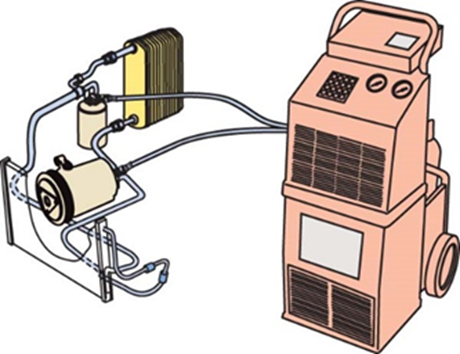UTI’s automotive air conditioning course, Technology Principles and Consumer Communication of Automotive HVAC, offers students the specialized training needed to diagnose, service and repair today’s vehicle air conditioning systems.1
What You'll Learn in the Automotive Air Conditioning Training
As automotive climate control systems become increasingly complex, this course prepares students to confidently handle a variety of diagnostic and repair scenarios. By developing key skills and knowledge of principles, students will be ready to meet industry demands for well-rounded automotive technicians.

Students are taught key topics that include:
Diagnosing Electronic Climate Control System Faults
Students will develop the ability to identify and resolve electronic climate control system issues. They will be taught to utilize advanced diagnostic equipment to accurately pinpoint problems, ensuring efficient and effective repairs.
Refrigerant and Refrigerant Oil Chemistry
The purpose of this part of training is to help students understand the chemical properties of refrigerants and refrigerant oils. They’ll study their role in cooling systems and how to handle them safely and efficiently.
Thermal Energy and Heat Transfer Principles
Students will explore the science behind thermal energy and heat transfer as it applies to automotive climate control systems. They’ll learn how these principles ensure optimal performance in a wide range of conditions.
Complaint Refrigeration Environmental Techniques
The focus will be on learning EPA-compliant techniques for handling, recovering and recycling refrigerants. Students will develop environmentally responsible practices to reduce their ecological footprint.
Ethical Communication and Customer Service
It’s important for students to learn how to create accurate and professional HVAC work orders, diagnose issues transparently and provide fair billing. They’ll focus on gaining skills to build customer trust and satisfaction.
Frequently Asked Questions
HVAC technicians typically work on heating, ventilation and air conditioning systems in homes or commercial buildings, while auto mechanics work on vehicle systems, including automotive A/C. The Technology Principles and Consumer Communication of Automotive HVAC course at UTI focuses specifically on diagnosing and repairing A/C systems in cars and light trucks.
If you’re interested in automotive A/C specifically, UTI’s automotive HVAC course is part of the 51-week Automotive Technology program. You can complete the entire program in under a year and graduate with the foundational skills to pursue an entry-level technician role.1,7
However, if you’re specifically interested in becoming an HVAC tech, check out our 9-10 month HVACR Technician training program!
The math used in automotive air conditioning is practical and focused on diagnostics, pressures and temperature conversions. At UTI, these concepts are taught step-by-step, including instruction in hands-on labs, so students can apply them in real-world scenarios—not just on paper.
The automotive HVAC course at UTI is completed over three weeks as part of the Automotive Technology program. It covers key areas like refrigerant handling, system diagnostics, component replacement and federal environmental regulations.
To service automotive air conditioning systems legally, you must be certified in refrigerant handling under EPA Section 609. This course, as part of the Automotive Technology program, can help you pursue this certification.
Learn All About Automotive Air Conditioning Technology at UTI!
Our Automotive Air Conditioning Technology Course combines classroom instruction with hands-on training using current tools and equipment to simulate real-world conditions.18
UTI’s experienced instructors guide students every step of the way, ensuring they leave with the skills and confidence needed to do pursue a career. Whether you’re just starting or looking to expand your automotive knowledge, our program provides the foundation.
Get more info on our Automotive Technology program when you request more info or call an Admissions Rep at 1-800-834-7308.

